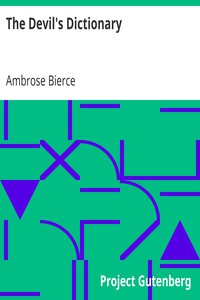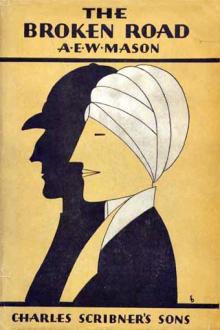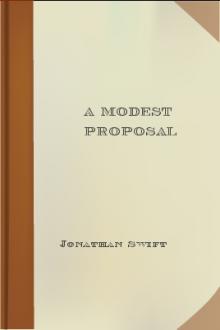The Devil's Dictionary by Ambrose Bierce (good novels to read in english TXT) 📗

- Author: Ambrose Bierce
Book online «The Devil's Dictionary by Ambrose Bierce (good novels to read in english TXT) 📗». Author Ambrose Bierce
HALF, n. One of two equal parts into which a thing may be divided, or considered as divided. In the fourteenth century a heated discussion arose among theologists and philosophers as to whether Omniscience could part an object into three halves; and the pious Father Aldrovinus publicly prayed in the cathedral at Rouen that God would demonstrate the affirmative of the proposition in some signal and unmistakable way, and particularly (if it should please Him) upon the body of that hardy blasphemer, Manutius Procinus, who maintained the negative. Procinus, however, was spared to die of the bite of a viper.
HALO, n. Properly, a luminous ring encircling an astronomical body, but not infrequently confounded with "aureola," or "nimbus," a somewhat similar phenomenon worn as a head-dress by divinities and saints. The halo is a purely optical illusion, produced by moisture in the air, in the manner of a rainbow; but the aureola is conferred as a sign of superior sanctity, in the same way as a bishop's mitre, or the Pope's tiara. In the painting of the Nativity, by Szedgkin, a pious artist of Pesth, not only do the Virgin and the Child wear the nimbus, but an ass nibbling hay from the sacred manger is similarly decorated and, to his lasting honor be it said, appears to bear his unaccustomed dignity with a truly saintly grace.
HAND, n. A singular instrument worn at the end of the human arm and commonly thrust into somebody's pocket.
HANDKERCHIEF, n. A small square of silk or linen, used in various ignoble offices about the face and especially serviceable at funerals to conceal the lack of tears. The handkerchief is of recent invention; our ancestors knew nothing of it and intrusted its duties to the sleeve. Shakespeare's introducing it into the play of "Othello" is an anachronism: Desdemona dried her nose with her skirt, as Dr. Mary Walker and other reformers have done with their coattails in our own day—an evidence that revolutions sometimes go backward.
HANGMAN, n. An officer of the law charged with duties of the highest dignity and utmost gravity, and held in hereditary disesteem by a populace having a criminal ancestry. In some of the American States his functions are now performed by an electrician, as in New Jersey, where executions by electricity have recently been ordered—the first instance known to this lexicographer of anybody questioning the expediency of hanging Jerseymen.
HAPPINESS, n. An agreeable sensation arising from contemplating the misery of another.
HARANGUE, n. A speech by an opponent, who is known as an harangue-outang.
HARBOR, n. A place where ships taking shelter from stores are exposed to the fury of the customs.
HARMONISTS, n. A sect of Protestants, now extinct, who came from Europe in the beginning of the last century and were distinguished for the bitterness of their internal controversies and dissensions.
HASH, x. There is no definition for this word—nobody knows what hash is.
HATCHET, n. A young axe, known among Indians as a Thomashawk.
"O bury the hatchet, irascible Red, For peace is a blessing," the White Man said. The Savage concurred, and that weapon interred, With imposing rites, in the White Man's head.John Lukkus
HATRED, n. A sentiment appropriate to the occasion of another's superiority.
HEAD-MONEY, n. A capitation tax, or poll-tax.
In ancient times there lived a king Whose tax-collectors could not wring From all his subjects gold enough To make the royal way less rough. For pleasure's highway, like the dames Whose premises adjoin it, claims Perpetual repairing. So The tax-collectors in a row Appeared before the throne to pray Their master to devise some way To swell the revenue. "So great," Said they, "are the demands of state A tithe of all that we collect Will scarcely meet them. Pray reflect: How, if one-tenth we must resign, Can we exist on t'other nine?" The monarch asked them in reply: "Has it occurred to you to try The advantage of economy?" "It has," the spokesman said: "we sold All of our gray garrotes of gold; With plated-ware we now compress The necks of those whom we assess. Plain iron forceps we employ To mitigate the miser's joy Who hoards, with greed that never tires, That which your Majesty requires." Deep lines of thought were seen to plow Their way across the royal brow. "Your state is desperate, no question; Pray favor me with a suggestion." "O King of Men," the spokesman said, "If you'll impose upon each head A tax, the augmented revenue We'll cheerfully divide with you." As flashes of the sun illume The parted storm-cloud's sullen gloom, The king smiled grimly. "I decree That it be so—and, not to be In generosity outdone, Declare you, each and every one, Exempted from the operation Of this new law of capitation. But lest the people censure me Because they're bound and you are free, 'Twere well some clever scheme were laid By you this poll-tax to evade. I'll leave you now while you confer With my most trusted minister." The monarch from the throne-room walked And straightway in among them stalked A silent man, with brow concealed, Bare-armed—his gleaming axe revealed!G.J.
HEARSE, n. Death's baby-carriage.
HEART, n. An automatic, muscular blood-pump. Figuratively, this useful organ is said to be the seat of emotions and sentiments—a very pretty fancy which, however, is nothing but a survival of a once universal belief. It is now known that the sentiments and emotions reside in the stomach, being evolved from food by chemical action of the gastric fluid. The exact process by which a beefsteak becomes a feeling—tender or not, according to the age of the animal from which it was cut; the successive stages of elaboration through which a caviar sandwich is transmuted to a quaint fancy and reappears as a pungent epigram; the marvelous functional methods of converting a hard-boiled egg into religious contrition, or a cream-puff into a sigh of sensibility—these things have been patiently ascertained by M. Pasteur, and by him expounded with convincing lucidity. (See, also, my monograph, The Essential Identity of the Spiritual Affections and Certain Intestinal Gases Freed in Digestion—4to, 687 pp.) In a scientific work entitled, I believe, Delectatio Demonorum (John Camden Hotton, London, 1873) this view of the sentiments receives a striking illustration; and for further light consult Professor Dam's famous treatise on Love as a Product of Alimentary Maceration.
HEAT, n.
Heat, says Professor Tyndall, is a mode Of motion, but I know now how he's proving His point; but this I know—hot words bestowed With skill will set the human fist a-moving, And where it stops the stars burn free and wild. Crede expertum—I have seen them, child.Gorton Swope
HEATHEN, n. A benighted creature who has the folly to worship something that he can see and feel. According to Professor Howison, of the California State University, Hebrews are heathens.
"The Hebrews are heathens!" says Howison. He's A Christian philosopher. I'm A scurril agnostical chap, if you please, Addicted too much to the crime Of religious discussion in my rhyme. Though Hebrew and Howison cannot agree On a modus vivendi—not they!— Yet Heaven has had the designing of me, And I haven't been reared in a way To joy in the thick of the fray. For this of my creed is the soul and the gist, And the truth of it I aver: Who differs from me in his faith is an 'ist,




Comments (0)